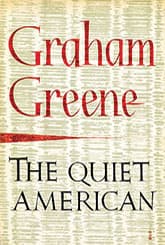The Quiet American
Critique • Quotes
 First edition
First editionFirst publication in book form
1955
Literature form
Novel
Genres
Literary
Writing language
English
Author's country
United States
Length
Approx. 59,000 words
The unquiet Brit and the Americans
The biggest obstacle to properly appreciating The Quiet American as a novel may be Graham Greene's uncanny political prescience. In the 1950s, when Vietnam wasn't yet on the radar for most Western readers, when U.S. foreign policy and military power were still widely seen as forces to make the world safe for democracy, here was a slender novel that seemed predict—and explain—the quagmire America was about to find itself in.
At least, that's the way it seems reading the book in the years since the bloody Southeast Asian debacle of the sixties and seventies. You have to get past that to recognize also what a wonderfully written novel The Quiet American is. And perhaps to judge where Greene went wrong.
The novel takes place in Vietnam when colonial power France was fighting communist-led forces from the country's north. Jaded British journalist Thomas Fowler has been covering the conflict for some time when he is befriended by an American, Alden Pyle, who arrives in the country purportedly to provide economic aid but is involved in CIA undercover work.
The American of the title, Pyle is portrayed as a wide-eyed believer that the United States can do good in the area by finding a "third way," supporting neither colonialists nor communists but backing democratic nationalist leaders. His effort in Vietnam inevitably leads to a local strong man using American support to launch bloody massacres on his own people for his own ends.
It's the old story of American exceptionalism—the idea that America is uniquely positioned to bring democracy to the world—an idea which has had dire consequences in Third World countries around the world.
Stripped down but British
But what keeps the story in Greene's hands from becoming a diatribe is how well the human tale is told and entwined with the political story. At the beginning of the novel we learn Pyle has been killed and Fowler knows something about it. We also soon discover Pyle's Vietnamese girlfriend, Phuong, once lived with the love- and opium-besotted Fowler. What happened to the three of them is a mystery that is unravelled in flashbacks throughout the rest of the novel.
The Quiet American is a very short novel, but it feels longer. Not because it's boring but just the opposite. It sounds so many depths. Each of the three lead characters. Fowler's allies and sources. The military forces. The complex social scene with everyone partying and conspiring. Daily life for the Vietnamese and the sudden violence that rends it. It's all explicated seamlessly in Greene's seemingly casual, stripped down, though still very British, style.
Greene has the ability to place you in a scene, no matter how alien to your normal experience, without belabouring description. He relies on character, behaviour, dialogue and the shrewd, laconic observation. The novel plays out as a succession of tense scenes that move the story forward while drawing deeper into the growing complexity of the characters' relationships.
Particularly engrossing is a terrifying sequence when Fowler and Pyle on a road trip north are besieged, along with a couple of scared, poorly armed Vietnamese soldiers, in a guard tower at night. A murderous unseen enemy surrounds them at night. The scenes are not only suspenseful but provide insight into the political and military situations, as well as into the two lead characters. The resolution leaves Fowler in debt for his life to his rival, which drives some of the contradictions that afflict him to the end of the novel.
At the end, as in so many Greene works, the main character is wracked with guilt, while having done what objective analysis showed was probably the right thing. He, like the reader, finds it difficult to separate personal motivations from moral imperatives.
When it came out, The Quiet American was attacked, at least in the United States, as being anti-American. Greene's critique was seen as especially galling coming from a British writer. The Brits were supposed to be America's great allies who had left their own former colonies around the globe.
Fresh-scrubbed appeal
But, if anything, the critique was milder than it could have been, for in the character of Pyle we saw an America that sincerely thought it was doing an undeveloped nation a favour by pointing out the way to independence and democracy. Pyle is fair and honest beyond any expectations of his rival in love and politics.
Greene, or Fowler, understands all too well the duplicitous political nature of the American and its bloody consequences, but he cannot entirely resist Pyle's fresh-scrubbed appeal. The boy couldn't help it.
In this—and I think a later Greene might agree—the Americans get off too easily. American foreign policy and its disastrous buildup of troops in the decade after the time of The Quiet American was hardly based on misguided good intentions. American imperialism had deeper sources that are ignored here to focus on the personal charms of one maddeningly naïve representative.
The first movie adaptation of The Quiet America in 1958 turned it into a gung-ho American film about the need to stop communism. A remake in 2002 was truer to Greene's vision, even subtly changing Pyle into a slightly shadier character, a revision I think the author would appreciate.
— Eric
Critique • Quotes

